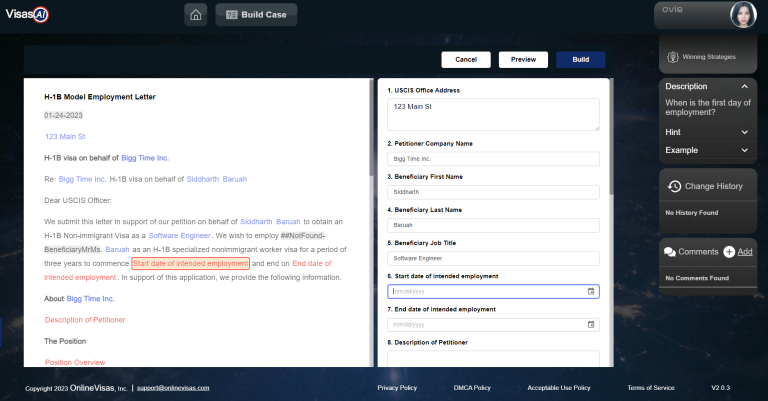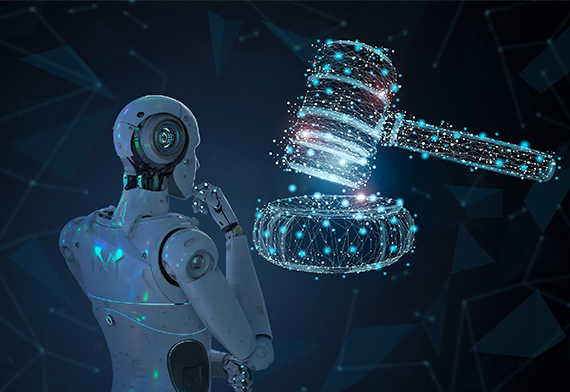iTech uses cookies so that we can provide you with the best user experience possible. Cookie information is stored in your browser and performs functions such as recognizing you when you return to our website and helping our team to understand which sections of the website you find most interesting and useful.
Case Study: Visas.AI For Immigration Attorneys
iTech developed the first-ever AI Platform that increased the success rate of US immigration visa process
We Consider No Challenge is Out Of Reach
Building an AI Platform That Helps Immigration Attorneys in the US be Faster and Better
The Challenge: Till now software applications in the legal industry were limited to case management software or form-building applications. No one had attempted to build an AI-powered platform that could identify issues ahead of time and build visually appealing briefs for immigration attorneys.
There is a reason why the AI platform that iTech built for immigration attorneys is considered groundbreaking. Attorneys are constantly having to adapt to a constantly changing body of law. Each year the President of the US, together with Congress, will decide on the numerical limit for refugee admissions. These challenges prevented most companies from considering developing a software platform for developing immigration briefs.
iTech brought its expertise in AI, ML and software application development and leveraged the 30 years of experience in the legal field of their client Velie Law Firm which owns OnlineVisas. The AI solution for full-service immigration law firms and immigration attorneys helps them analyze vast amounts of historical case data to identify probable issues and arrive at scenarios that have a greater certainty of success.

The Results: As Published by Ritz Herald News Coverage
The success of the AI platform, Visas.Ai, Measured by Actual Numbers
The first month of application, showed how Ai in law can help to speed up the immigration process.
- Using Visas.AI, the law firm was able to file 70 H-1B visas in just one day.
- It filed 460 H-1B visas in one month.
Vs.
Compare this one-month record with the previous full-year number of 457 visa petitions of all types. The approval rate was 99% compared to the previous 95%.
The Ritz Herald coverage of the Visas.AI platform can be viewed here
The Features of Visa.AI
Intelligent Immigration Platform
A Machine Trained To Think Like an Attorney
The AI algorithms are based on countless RFEs, Denials, regulations, agency decisions as well as US Federal case law.
RFEs are sent from the United States Citizenship and Immigration Services or USCIS. It is a request for additional information. An RFE is always a time-consuming process for Attorneys.
Visas.AI technology can help to remove this roadblock in Request for Evidence and win more cases. It helps in research as well as reducing attorneys’ administrative work.


Ai in Law Processes can Identify Issues Ahead of Filing
- The intelligent platform uses an AI-based Large Language Model to identify issues in visa petitions
- It identifies possible roadblocks upfront and provides recommendations to answer the issues in the initial filing itself
- It reduces RFEs and improves approval rating to as high as 98%
- It reduces the time and people involved in the visa application process for immigration attorneys. Improving accuracy and efficiency.
Document Management
Automated document parsing using Machine learning, OCR, and RPA techniques can index and parse documents that are uploaded by clients and use the information to fill out forms or other relevant documents.
It can also build custom documents based on briefs, business plans or affidavits.
It can provide strategies based on information from a constantly evolving database known as Winning Strategies.

Our Client: Jon Velie, a US Immigration lawyer
Jon Velie is the founder of Velie Law Firm and the CEO of Onlinevisas. Their US visa immigration petition process has been called ‘the best briefing style in the industry’. Jon Velie, the company’s lead attorney has practiced immigration law since 1993. The law firm has expertise in US business visas, Employment-based Green Cards, Sports and entertainment visas to the US, Family Based Gren cards and Visas, and Extraordinary Ability Visas. This expertise with a strong online presence made them decide to for the first time use AI in law for the US immigration visa process. After carefully evaluating iTech’s body of work and development expertise they entered into a technology partnership with us to develop their immigration AI-based platform.
FAQs for Legal AI Platform
How can implementing Legal AI in software solutions help attorneys
AI or Artificial intelligence is not a single technology. It includes Machine Learning, Natural Language Processing (NLP), and robotics. NLP is mainly behind most legal Ai applications since the law is text heavy. Logical AI/inferencing is very helpful in guiding clients through questionnaires that help attorneys to draft legal documents, particularly in the immigration process. Legal research platforms like Visas.AI have applied AI in law extensively to their solutions.
What are legal AI tools?
AI-powered legal research software is popularly known as legal AI. With legal AI tools, attorneys, paralegals, and legal professionals can quickly search a large database of regulations, statutes, practice areas, jurisdictions, case laws, etc. They can easily understand precedents and build stronger briefs.
What are AI legal assistants?
Legal assistants or paralegals work on simple legal tasks so that attorneys can concentrate on the more complex processes. An AI legal assistant is a software that can assist attorneys in document reviews, providing contract negotiation strategies as well as doing legal research. They have the added advantage of being able to identify any weakness in legal arguments.
What is automated document parsing?
Legal documents can cover sheets upon sheets of information. It is not only enough to pull text from these documents but assign keywords or entities to this information such as names of plaintiffs, defendants, attorneys, and judges as well as addresses, etc. Automated document parsing can do this with a high level of accuracy. Text extraction uses OCR or optical character recognition. It also uses AI and NLP models to build custom algorithms that are domain-specific to increase the accuracy of document parsing.



